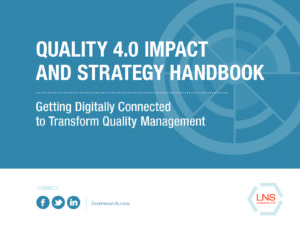The most recent decade has seen rapid advances in connectivity, mobility, analytics, scalability, and data, spawning what has been called the fourth industrial revolution, or Industry 4.0.
This fourth industrial revolution has digitalized operations and resulted in transformations in manufacturing efficiency, supply chain performance, product innovation, and in some cases enabled entirely new business models.
This transformation should be top of mind for quality leaders, as quality improvement and monitoring are among the top use cases for Industry 4.0. Quality 4.0 is closely aligning quality management with Industry 4.0 to enable enterprise efficiencies, performance, innovation and business models. However, much of the market isn’t focusing on Quality 4.0, since many quality teams are still trying to solve yesterday’s problems: inefficiency caused by fragmented systems, manual metrics calculations, quality teams independently performing quality work with minimal cross-functional ownership, and ineffective supplier communication, among others.
Interestingly, a vast number of existing quality-centered Industry 4.0 initiatives are not being led by quality, but by IT, operations, engineering, or sales and marketing. Many conversations with quality leaders make it clear that a large portion of them do not possess a clear understanding of Industry 4.0 technologies, their application, and their importance. This lack of understanding is preventing quality from effectively leading the charge on Quality 4.0.
Quality 4.0 isn’t really a story about technology. It’s about how that technology improves culture, collaboration, competency and leadership. It’s also about the digital transformation of management systems and compliance. Although it’s an advanced topic, this also isn’t a story about tomorrow, since leading manufacturers are already on their Digital Transformation journey.
This eBook provides manufacturers with the tools and insights required to lead the Quality 4.0 transformation. It communicates the technologies, how they transform people and processes, existing concrete accomplishments by peers, and guidance to enable the transition from traditional quality to Quality 4.0. Regardless of who leads the Quality 4.0 transformation, those that apply the technology to greatest effect will be the innovation leaders of tomorrow.
Read The Quality 4.0 Impact and Strategy Handbook!

%20(1).png?width=773&height=112&name=Generis%20Logo%20full%20Colour%20(Large)%20(1).png)

.png)
-2.png)
